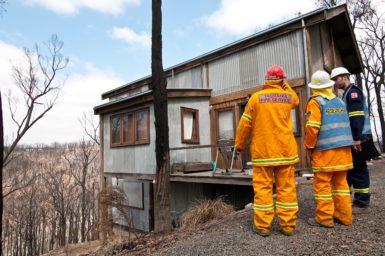EU-Australia bi-lateral workshop on developing and using web-based resources

Summary

For Australia the impacts of a changing climate are no longer a future risk but a lived experience. The recent fires devastating huge expanses of the country and contributing to wider impacts, including air pollution, are only one way in which changes in climate are set to impact the security, health and livelihoods of Australians.

Gaining an understanding of and addressing the risks arising from climate change requires access to high quality data and knowledge. A number of online ‘climate intelligence’ platforms providing climate change science-based data and information have been developed to meet this need. These include the Climate Change in Australia (CCiA) portal and separate and specialised but otherwise related portals designed to meet specific state needs (Queensland Future Climate Dashboard, Climate Futures for Tasmania, and Victorian Climate Projections 2019) and those of a specific sector as in Australia: CoastAdapt. Each of these provide access to data and to some extent include information, guidance materials, tools and other resources with the intention to provide the decision-making needs of its targeted audiences. In addition to these platforms, there are a number of platforms which aim to meet the needs of the wider Pacific and SE Asia region, including the Pacific Climate Change Science website, Pacific Islands Regional Climate Centre (PI-RCC) Network, the Asia-Pacific Adaptation Platform (AP-Plat) and the Regional Climate Consortium for Asia-Pacific (RCC-AP).
The purpose of the workshop is to share experiences and explore relevant issues, challlenges and potential ways forward around best practice (digital and domain) delivery of climate ‘intelligence’ platforms for Australia. It will bring climate intelligence users and experts together from across Australia and Europe to find ways to better develop and use web-based resources to enhance climate intelligence and support climate action. A draft program can be downloaded from the right-hand column.
This workshop is being run as part of the KE4CAP Project and is co-funded by the European Commission, the National Environmental Science Program (NESP) Earth Systems and Climate Change Science (ESCC) Hub and the CSIRO Navigating Climate Change (NCC) Mission. In that it is part of KE4CAP, the outputs of this workshop will be used to inform the programmes and deliberations at the other KE4CAP knowledge exchange events and will therefore benefit the broader KE4CAP community.
- Meeting start: 03/03/2020 at 08:15
- Meeting close: 05/03/2020 at 15:30
Click here to read the full report for this workshop.
Workshop themes and objectives
This knowledge exchange workshop will bring together experts and users from across Australia and from Europe working on climate policy, climate intelligence and resilience and related data/information/knowledge portals and platforms to explore and discuss the following themes:
- Standards and QA/QC
- Linking platforms (challenges and way forward)
- Business models: The value proposition
- Linking science and service: Integrating third-party knowledge
- Traditional knowledge and co-learning
- User engagement
- Governance and resourcing
- Digital-domain balance
- Evaluating and updating content
- Retaining relevance (policy and practice)
Objectives of the workshop
The purpose of the workshop is to share experiences and explore relevant issues, challlenges and potential ways forward around best practice (digital and domain) delivery of climate ‘intelligence’ platforms for Australia. Specifically, the aim of this event is stimulate knowledge exchange on improving the relevance, usability, legitimacy and credibility of the data, information and guidance available on web-based adaptation platforms by:
- Sharing knowledge on ‘best’ practices based on experiences and lessons learnt in developing, delivering and updating web-based adaptation platforms; and
- Exploring existing and evolving challenges and innovations and means of taking these forward.
Key messages from the workshop
- The EU-Australia BKE event illustrated the greater focus in Australia on platforms supporting action for disaster risk reduction/resilience and action in the private/financial sector as compared to the European focus on meeting policy requirements – both are potential areas for mutual learning.
- Australians involved in moving forward on supporting climate action through web-based platforms noted that they had many of the same drivers and motivators as those identified within KE4CAP, and welcomed the timely opportunity provided by the KE4CAP project to share learning and move forward.
- Through this BKE event, discussions moved to a focus on governance, business models (including defining a value proposition) and enhancing the engagement of users. These were identified as additional challenge areas where sharing experiences and lessons learnt could help provide mutual benefits.
- One area of particular focus was the need in Australia to better integrate knowledge inputs from indigenous people through appropriate and effective engagement, and also better consideration of their requirements when designing and delivering information to support climate action.
Knowledge exchange between different territories is always rewarding but the EU-Australia Workshop was particularly useful as it enabled discussion on topics that highlighted:
- The importance of actively involving indigenous people and that embedding indigenous knowledge will only enrich any platform developed.
- The potential benefits of working with commerce when developing any platform in terms both of initial production and sustainable underpinning of the resource.
- That having a respected and highly used on-line resource in itself does not always ensure longevity.
- The need for bi-lateral communication across all levels of government and between sectors within government.
- That different jurisdictions make have different drivers and levels of complexity but the fundamental desire to help to deliver resilience through effective adaptation is common.
- That there is a continuous need to be aware of previous, current and future initiatives in order to ensure coherence, encourage synergy and avoid duplication of effort and thus get the maximum return for any investment in climate adaptation platforms.
- That in Australia there is significant capacity, and most importantly enthusiasm, within the climate services community to deliver at a national, state and local level despite what is felt to be a historical lack of political support – though this is not ideal, progress can still made even in less than perfect circumstances.
- That whilst it may be daunting, it is possible even with limited resources to make a difference and that this initial attempt if properly nurtured can grow significantly and in a relatively short time.
Further information read the full report on the EU-Australia BKE.
(0) Comments
There is no content